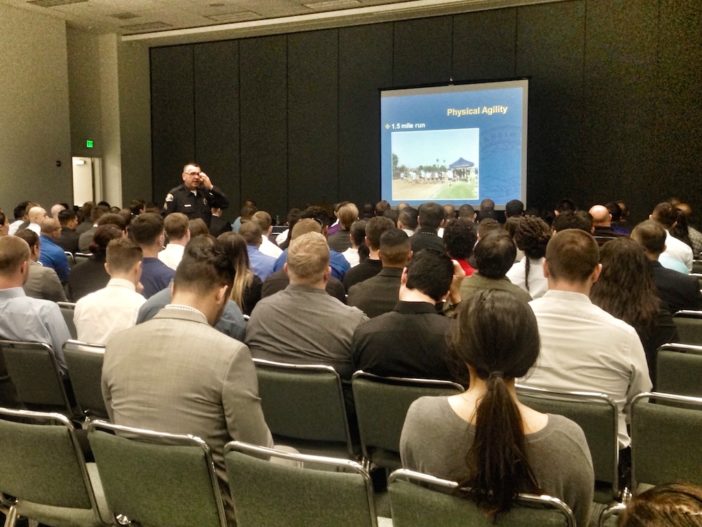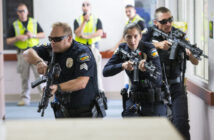The hallway outside the Anaheim Convention Center meeting room was crowded with young men and women dressed in business casual attire. The email they had received a few weeks before stated as much: “Please dress in business casual attire.”
Apparently, a few had neglected to read that part of the instructions. One young man was wearing gym shorts and a workout top. Another young lady looked as if she was dressed for a night out on the town with her friends.
Both drew the attention of the personnel staff monitoring the meeting. Ability to follow instructions is important for potential police officers.
I spoke to a few of the applicants. With all that’s been going on in the world, I was curious as to who would want to be a police officer these days.
Emelina Garcia had driven down from the Bay Area just to attend the orientation meeting. She told me she has close family members who are police officers and they all are great people.
Ana Torres, from Delano, was a police explorer scout. She knows lots of police officers personally and considers many of them friends. She doesn’t let what others are saying dissuade her. She knows too many good cops.
Anthony Abriel, from Palm Springs, told me he wanted to be a police officer because of a childhood experience. He and his mother were rescued from an abusive father by police officers who responded to their call for help. He has never forgotten how they were treated. To him, police officers have been his heroes ever since.
According to Personnel Sgt. Mark Brucks, there still are a lot of people wanting to be police officers. Not many, however, are going to make it through the process.
The orientation meeting is the first stage in the hiring process for the Anaheim Police Department. The meeting is mandatory before continuing in the process.
Earlier that morning, a POST (Peace Officer Standards and Training) representative told a group of us that statewide, only about 5 percent of applicants were making it through the selection process.
It’s difficult to say what area of the process leads to the highest loss of applicants. Today it seemed that just showing up was really hard for some people.
Of the 186 applicants who signed up and said they would attend today’s orientation, only 133 showed up.
I can understand things come up, but if you’re serious about your career choice you would think showing up wouldn’t be that hard.
Thinking I might have caught them on a bad day, I checked with the personnel detail investigators. They told me this is pretty consistent with their experience.
Must be a generational thing.
In 1979, I started the process to become a police officer by waiting in line starting a 4 a.m. I wanted to make certain I would get one of the 400 applications that would be handed out that day.
Investigator Vincent Delgado went through a detailed presentation listing the step-by-step hiring process.
The process is not quick.
On average, it takes from six to nine months to get an applicant through the process. But the experience is different for every applicant.
For the Anaheim PD, the process begins with the orientation meeting.
Investigator Delgado went through the entire process, including testing and background checks. Most importantly, he went over the things that will get you disqualified from the process.
Felony and serious misdemeanor convictions, past serious drug use and poor history of financial responsibility are just some of the things that can get you disqualified.
Then there is lying about your background or being less than truthful, having a poor job history or even a history of not playing well with others in the workplace.
It was time for a break in the 2½-hour presentation. The opportunity was given for the applicants to ask questions privately of any of the staff.
Lines formed as each member of the staff was asked questions most applicants would rather not ask publicly.
The questions seemed to focus around prior drug use and financial responsibility.
It was surprising to hear how many candidates were in their early 20s and already seriously in debt. Maybe it’s just another generational quirk.
At the end of the break after the group reconvened, 22 applicants decided not to go on after hearing the presentation.
Now there were 111 applicants left.
Luckily, this was only one of several orientation meetings taking place over the next few weeks.
The real testing begins with the written exam followed by a physical agility test, and then an oral interview. At each step, candidates will be lost.
In all likelihood, only two to three in this room will make it to the academy.
For them, the next six to nine months will seem like an eternity.
I wish them the best.
Joe is a retired Anaheim Police Department captain. You can reach him at jvargas@behindthebadgeoc.com.
 Behind the Badge
Behind the Badge



